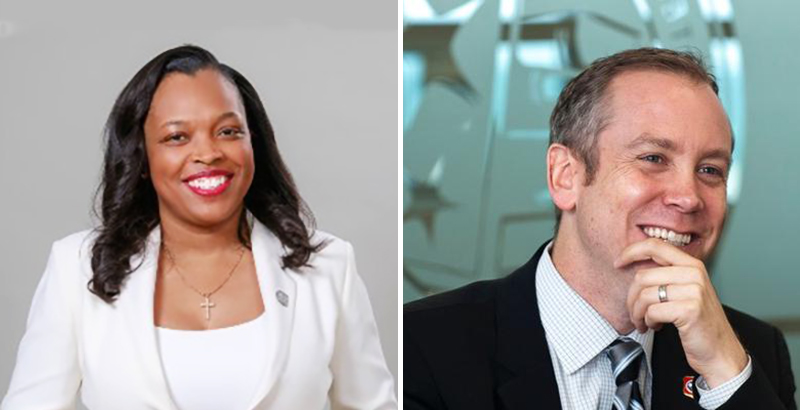Huffman & Jackson: This Is a Once-in-a-Generation Opportunity to Expand High-Quality Tutoring for all Students Who Need It. Our New Nonprofit’s Grants Can Help

Get stories like this delivered straight to your inbox. Sign up for The 74 Newsletter
As schools head into the final quarter, exhausted teachers and administrators are completing their third consecutive year disrupted by the pandemic. Assessments and other year-end data will provide a more complete accounting of the state of American education, but the evidence to date is disturbing.
In aggregate, students are struggling with their early reading, with their math, with their attendance, their behavior and with their mental health. We, collectively, have been through a lot, but schools and young people have borne perhaps the heaviest national burdens. In particular, lower-income and Black and Latino students — those who missed the most in-person instruction and live in communities hit hardest by COVID — lost the most academic ground, exacerbating pre-existing achievement gaps.
We believe this is a critical moment for schools and students. One of us ran the third-largest school district in the country and the other ran a state education agency, and each of us feels drawn to these key questions: How can all of us working in education help ensure that schools have the right strategies and tools to close the massive learning gaps that have widened over the last two years? How can we help students access the support and ongoing relationships they need to thrive? And, knowing that the current gaps will not close overnight, how can we help ensure that high-impact work continues after federal stimulus funding goes away?
These questions led us to the epicenter of pandemic academic recovery: nationwide efforts to implement high-impact tutoring.
Many districts, seeking help for struggling students, have turned to tutoring as a possible intervention, pouring a large sum of federal stimulus dollars into this work. According to a state-by-state breakdown from FutureEd, an independent think tank at Georgetown’s McCourt School of Public Policy, school systems are on track to spend as much as $3.6 billion over the next two years on tutoring.
This is not surprising. Effective tutoring is one of the few educational interventions with a strong research base. The best approach meets particular design principles: student groups of four or fewer, meeting multiple times a week, with a trained and consistent tutor and high-quality curriculum. Implemented effectively, high-impact tutoring helps students gain ground academically, improves attendance and connects students with an additional trusted adult for support.
However, high-impact tutoring is hard to scale. It is difficult in any labor market, but especially this one, to recruit enough adults to work with millions of students in small-group settings. Those challenges also make this form of tutoring expensive — in all likelihood, too costly to sustain at the necessary scale after federal stimulus funding runs out.
At the same time, many districts have purchased online products created through a booming ed tech sector, ranging from live tutoring via Zoom to artificial intelligence-enabled computer work. Technology-driven interventions are, of course, significantly more scalable than labor-intensive ones. However, while some tech-based products have potential, the quality varies and few have a sufficiently rigorous research base. Schools, under duress from the myriad challenges of the current environment, are ill-equipped to make informed purchasing decisions.
In short, tutoring has enormous potential to help students catch up. It also faces myriad barriers to effective implementation and scale.
Last week, in partnership with leading researchers and philanthropists, among others, we launched Accelerate. It is a national nonprofit, incubated and launched at America Achieves, that will focus on ensuring that all students have access to free and effective tutoring in the years ahead. Our belief is that, collectively as a sector, we must accomplish several key objectives to unleash the full potential of tutoring.
First, encourage and facilitate innovation in tutoring while holding the bar high for research and evidence. To that end, we released a “Call to Effective Action,” asking districts, states, private tutoring providers and community organizations to apply for grants of up to $1 million to try innovative strategies over the next two school years. Participants will come together as a cohort to look at outcome data and share successes and challenges, and they will be paired with researchers so we can learn — in real time — what practices have the most promise to help children.
Second, systematically look for ways to lower the cost of tutoring and personalized learning. This effort will likely come from a mix of in person and online interventions, but the price must come down if the benefits of tutoring are to continue after federal stimulus funding ends.
Third, enact federal and state policies — and dedicate ongoing funding — that encourage districts and schools to adopt evidence-based practices and discourage them from purchasing products and curricula that may not work. Additionally, examine school-day structure to ensure blocks of time can be devoted to proven, research-based individualized learning.
The nation’s public schools will spend billions of dollars over the next two school years on tutoring and personalized learning in the effort to catch students up. It is critical that these resources both help those who desperately need support today and build a base of knowledge that will change how schools operate moving forward. This can be accomplished only through a commitment to innovation, research and efficient sharing of lessons learned. We are hopeful that Accelerate can help fill this role.
We all watch the news and see adults infusing politics and the culture wars into school conversations. After a year of watching school board meetings rife with fights about masks, quarantines and book banning, wouldn’t it be nice to come together to focus on helping children learn?
Kevin Huffman is a former Tennessee commissioner of education and the CEO of Accelerate, a national nonprofit launched to support the growth and success of tutoring and personalized learning in public schools.
Dr. Janice K. Jackson is a former CEO of the Chicago Public Schools and the CEO of Hope Chicago. She is executive chair of the Accelerate board.
Disclosure: Walton Family Foundation, Overdeck Family Foundation and the Bill & Melinda Gates Foundation provide financial support to Accelerate and The 74.
Get stories like these delivered straight to your inbox. Sign up for The 74 Newsletter

;)
